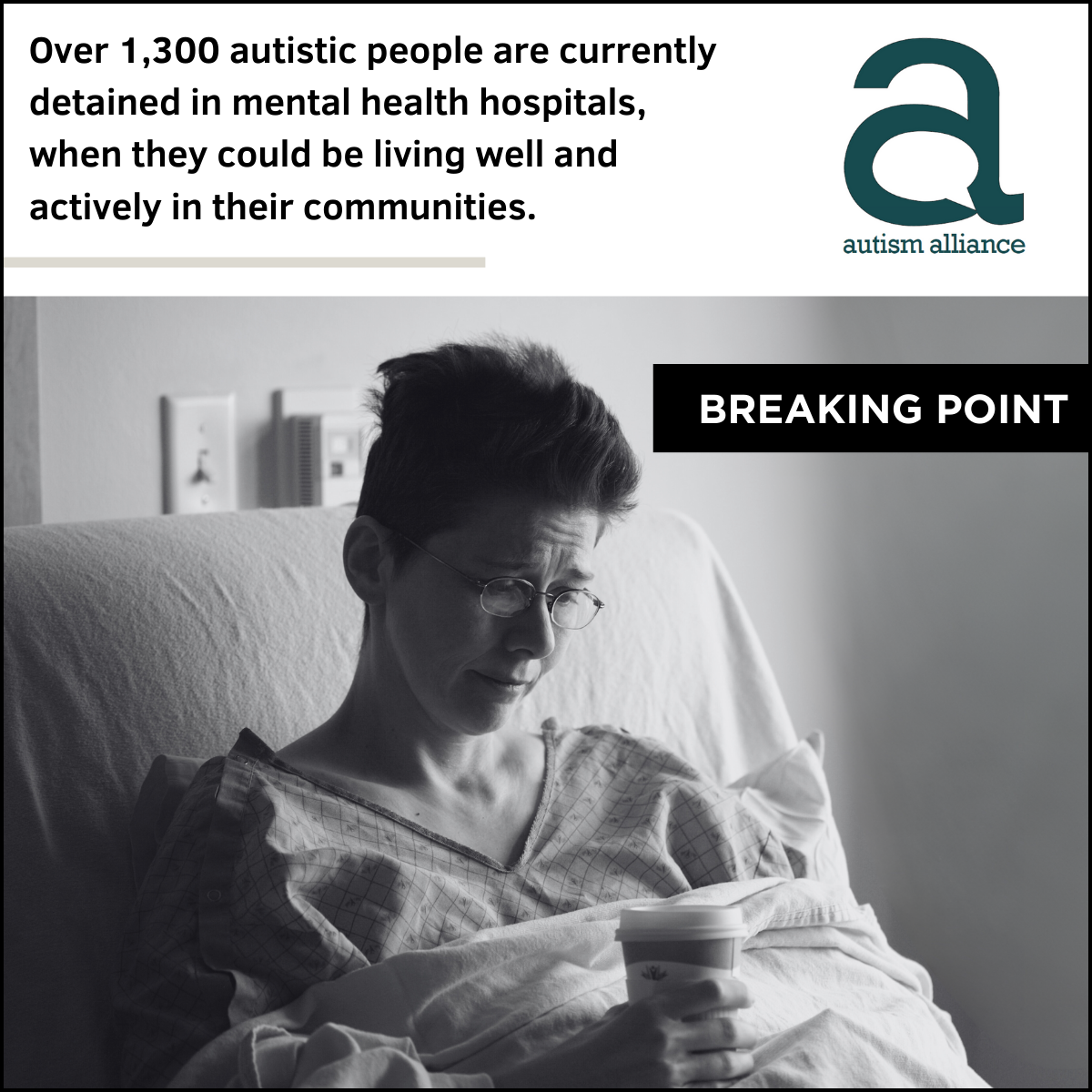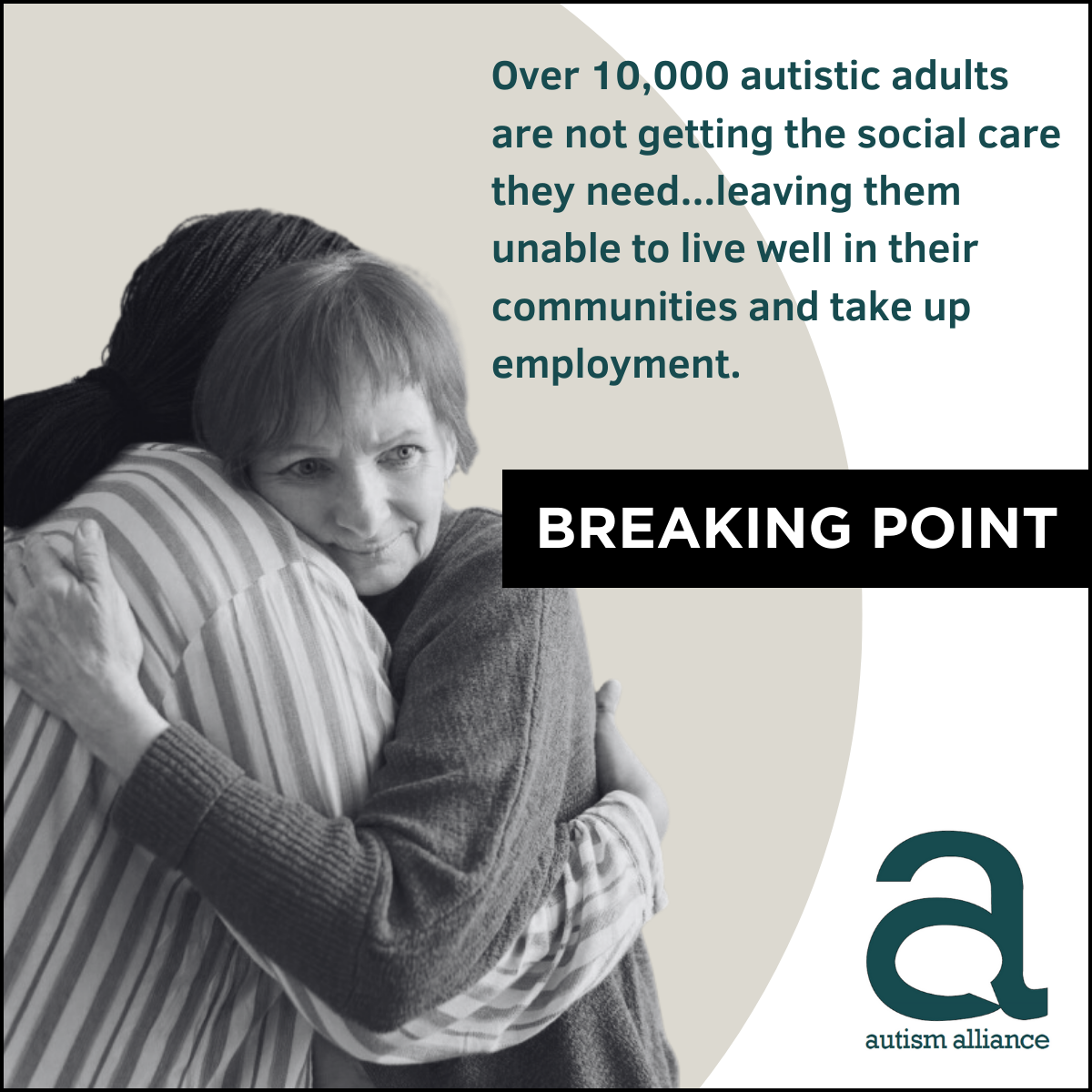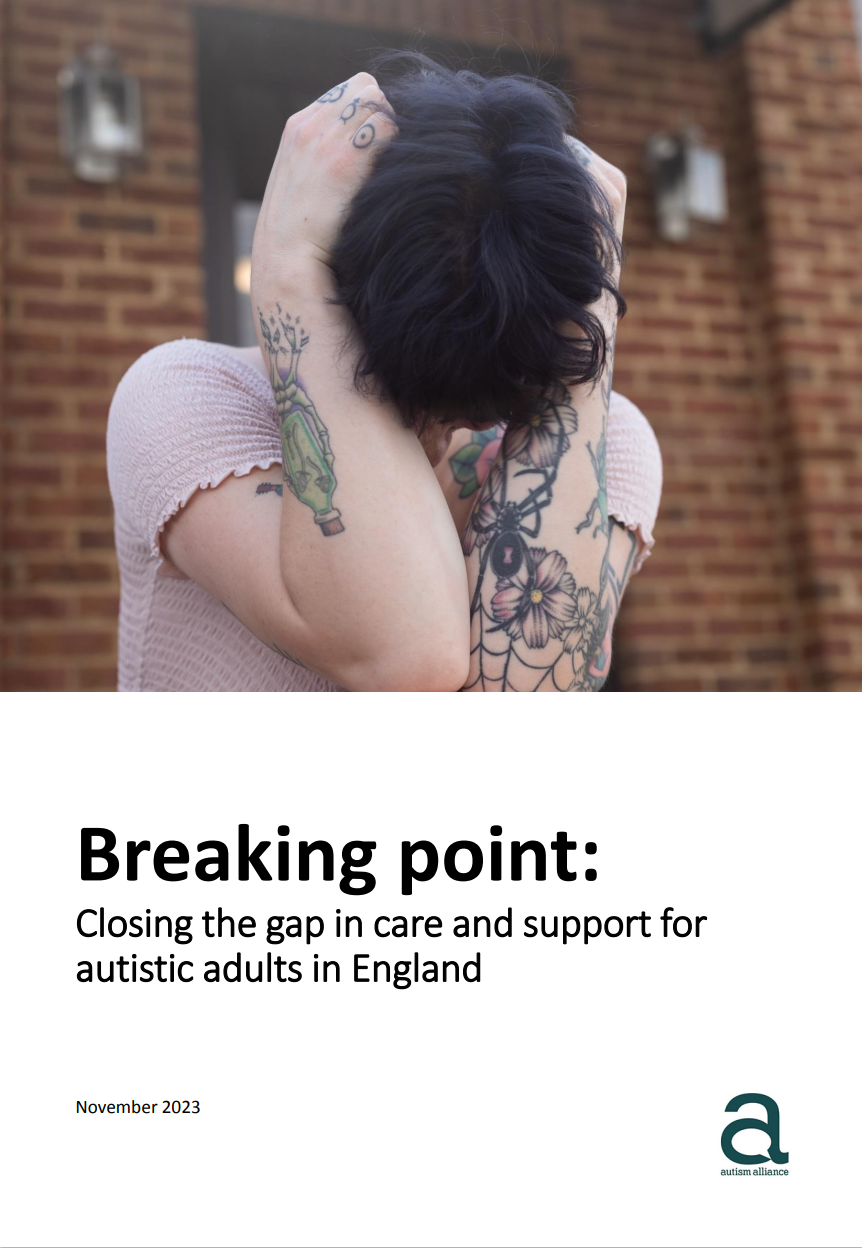BREAKING POINT:
Our campaign to close the gap in care and support for autistic adults in England
“Everything is a fight – it should not be a fight.
To get a diagnosis is a fight, to get the correct support is a fight, getting the right education is a fight.
It’s never ending and it shouldn’t be like that. It’s basically a question of money and understanding: there are too many obstacles in the way.”
Autistic adult and focus group participant, 2023
New research shows that autistic adults and their families are being driven to BREAKING POINT
Research commissioned by the Autism Alliance in 2023 shows that thousands of autistic adults across England are not receiving the social care they need, preventing them from living well and actively in their communities, and from taking up work.
A lack of care also means that too many autistic adults reach crisis point, leading to family breakdown and confinement in mental health hospitals.
Beckii and Elliot’s story
“We thought he’d be in and out…but it was more than four years until he came home.”
Beckii Davis, 30, spent more than four years campaigning for her autistic brother Elliot Dodds, 28, to be released from long-term segregation in hospital after he suffered a mental health crisis.
Elliot also has epilepsy and a moderate learning disability.
“Mum repeatedly said she would be happy for him to come and live back at home, with support, but the request was continuously blocked.”
PHOTOS:
TOP: Beckii and Elliot now.
BELOW: Beckii and Elliot, taken on the day he was discharged from hospital - more than four years after their ordeal started.
What helps autistic people live happier healthier, more fulfilled lives?
Adult social care plays an essential role in helping autistic people live happier, healthier, more fulfilled lives.
Specialist care providers that understand autism and use person-centred approaches can help autistic adults live well and actively in their communities, enter employment, and prevent the escalation of need that too frequently leads to crisis.
This can range from specialist care in the home, or supported living to peer-led support groups and local advocacy services.
Why are autistic people at breaking point?
Across England, autistic adults face a double disadvantage.
They are being failed by the social care system which, starved of investment, cannot meet demand for specialist social care. The implications for autistic adults and their families are profound. Already experiencing stark inequalities, which are magnified because of a lack of care and support, too many face a deterioration in mental health which leads to crisis.
“Despite many commitments to improve the lives of autistic people, plans to build the right support in communities are not working. Autistic people should not have to reach crisis before support is provided and should never be detained in mental health hospitals.
“The injustices faced by autistic people and people with a learning disability need to end. The Government should urgently consider its plans, and all parties should, as a priority, set out how they can make real progress on this in the next Parliament: which must include plans for a new Mental Health Bill which should have been part of this year’s King’s Speech.”
— Sir Robert Buckland KC MP, Chair of the All-Party Parliamentary Group on Autism
The impact of the gap in social care
77% of autistic adults reach crisis point while waiting for care
Leading to family breakdown and for some, confinement in mental health hospitals, where they face restraint, medication and trauma.
Over 10,000 autistic adults with a moderate learning disability are not getting the social care they need
Leaving them unable to live well and actively in their communities and unable to take up employment.
44% of autistic adults wait more than 2 years for any action to be taken to provide care
And almost half (48%) say that even where care is provided, it does not meet their needs.
This is in direct contravention of the Care Act 2014, which is clear that people with eligible needs for care should receive care, and that local authorities should promote wellbeing and reduce or prevent the escalation of need.
The law is being broken daily across the country, because there is not enough money in the system to meet demand.
“The findings of the Breaking Point Report are deeply concerning but regrettably unsurprising. We continue to hear too many first-hand stories of how families are struggling to access the social care they deserve, with too many autistic people with learning disabilities ending up in units not designed to care for their needs.
“This issue has been going on for too many years. We once again call on the authorities to do more to improve social care. Autistic people should be entitled to receive tailored community care packages which allow them to live as independently as possible and allow them to thrive.”
— Kirsty Stuart, leading human rights lawyer, Irwin Mitchell, who has represented the family of Elliot Dodds
“We are regularly instructed on behalf of autistic adults and/or their families, where local authorities are not meeting their legal duties in accordance with the Care Act, and where a lack of funding appears to be the main obstacle. Autistic people and people with a learning disability often bear the brunt of this lack of funding because their specific needs go unmet.
“It is clear that at the national level, serious discussion is required about how the social care system can fulfil its functions as defined in the law.”
— Alex Rook, leading human rights lawyer, Rook Irwin Sweeney
How do we fix this?
The cost of closing the gap in social care provision for autistic adults is a fraction of what is spent each year through the adult social care budget.
It is likely to be between £70 million and £140 million, plus the cost of specialist workforce recruitment and retention.
This is achievable as part of meaningful reform of social care, and through addressing inefficiencies in spending across health and care.
Investment needs to be accompanied by reform: more understanding of autism, and a focus on wellbeing and prevention rather than responding to crisis.
What is the cost of doing nothing?
The amount spent on confining autistic people in mental health hospitals could pay to close this gap between 2 and 4 times over.
But there are other critical reasons to act. As well as ending a scandal in human rights, closing the gap in care for autistic adults would drive economic benefits for the country.
Providing the care that allows autistic adults to live well and actively in their communities could increase productivity through increased employment, drawing on autistic people’s strengths, and reduce the use of costly long-term inpatient mental health facilities.
A system of social care that works for autistic people can work for everyone.
“We all want to live in the place we call home with the people and things that we love, in communities where we look out for one another, doing things that matter to us.”
How you can support our campaign
Share the campaign report and new research on social media
Our Breaking Point Campaign Pack contains suggested social media posts and graphics.
You can download the pack below.
Support campaign activity on social media using our hashtag:
#BreakingPointCampaign
Look out for social media posts from the Autism Alliance and supporting organisations.
Write to your MP and/or Metro Mayor in England
Draw their attention to the unacceptable failure of social care for autistic adults, share the campaign report and new research, and ask them to write to the Prime Minister and Secretary of State for Health and Social Care. Use the template letter in our Campaign Pack.
Sign up as a supporter of the Autism Alliance UK
Join the wider group of organisations and people calling for systemic reform to address the unacceptable inequalities autistic people and their families face across services and society.
Social media resources
Available in our Campaign Pack.
Share your story
You can also support the campaign by helping us find more autistic people and their families who would like to share their stories.
If you would like to explore sharing your story publicly and in the media, or know someone who may be prepared to share their experiences, you can contact the Autism Alliance. We will be in touch and may be able to feature the story as part of the campaign.
Download our reports and resources
Breaking Point report
Campaign research report
Breaking Point campaign pack
Letter to your MP
Our letter to the Prime Minister and Secretary of State for Health and Social Care
On 18 November 2023 we sent a letter calling for change to the Prime Minister and the Secretary of State for Health and Social Care.
This was signed by many supporting organisations and can be read below.
Or you can access a PDF copy here.
Media enquiries
For any media inquiries please contact Cause Communications:
Jenna Sloan on 07914 424987. Email here
Sam Carlisle on 07850 111213. Email here
Legal support
If you are interested in exploring legal support on this or similar, here are two law firms who have done good work supporting autistic people and their families:

















